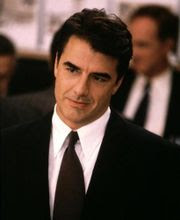Related Posts
A shift in power was clearly occurring.

I'm still debating if the emergence of the Spice Girls adds to any validity to this trend. The constant "Girl Power" shouting probably had some effect but it's hard to look past the shameless corporate manipulation. Although in conjunction with the explosion of boy bands such as N'Sync and the Backstreet Boys, the entertainment industry obviously regarded young women as a powerful new demographic that demonstrated surprising purchasing power.
Then again, boy bands were nothing new. New Kids on the Block and arguably The Jackson 5 proved that teenage girls were a worthy target market.
What effect did this have on young guys? If my experience during the New Kids phenomenon revealed anything, it's that every boy hated these bands. How was a pre-pubescent dork ever going to compare to Donnie Wahlberg or Justin Timberlake? One couldn't even fake an interest in the bands to gain some commonality with a girl, since it would be a traitorous gesture towards fellow guy classmates. Or worse one would be perceived as kind of girly by the actual girls one was trying to be near.
Friends was in many ways the seminal 90's show. Three women, three men living modern lifestyles in a modern New York City. Women would talk openly about sex, even among the men. The women were beautiful and liberated. One was a free spirit, one left her fiance to pursue her own path, one would start her own business.

Yet the men were not as progressively portrayed. One was a three-time divorcee who got strangely creepy over the years, one was completely incompetent towards women, one was good looking but a total idiot. All three were relatively emasculated, safe men who posed no threat or excitement towards women at all. Even Joey, the "womanizer", was at the core a sensitive, teddy bearish softie. Here, men were stripped of all edge and power. Bad boys were not accepted in this world vision, just the boy scouts. The women could be adventurous and promiscuous, and come back to relay their stories to non-threatening boys who would comfort and accept them for who they were.

Sex and the City took the attitude further by turning men into fetishized objects. Now, women were the sexual conquerors, and men were just a by-product of the story. The ultimate male trophy for the show's heroine was Mr. Big, a true object that wasn't even graced with a proper name until the end of the series when he had succumbed.
Imagine the outrage if the show were about four men and their sexual exploits.
Men, losing their throne of power for the first time, did the only thing they could do: revolt and fight back. Cue The Man Show.
I'd already touched on the films Fight Club and American Beauty which played roles in highlighting the reaction towards men's plight. What is poignant for me is that both films resisted the urge to cleanly resolve the conflict. As if to say that even the men who were fighting back already understood that things would never go back to the way they were.
Tyler Durden's fight clubs and their attempts at throwing off the shackles of modern materialism resulted in nothing but more chaos and even more restraints. It sought to prove that maybe another woman wasn't the answer, but neither was just another man.
Interestingly, Fight Club, like SATC, utilized the lack of a name for its main male protagonist, possibly alluding to a similar loss of humanity. But I believe the purpose was more about the conflict of the id and ego, where the ego was so marginalized in the psychological battle that he ceased to exist as an equal identity.

Similarly, American Beauty began with the main character externalizing all of his troubles. His job was oppressive, his wife hated him, his daughter was a mystery. It wasn't until he realized that he still had the ability to control his own destiny. The final moment of solace came when he accepted the fact that he could reconnect with his daughter by simply trying to reach out to her. Then he died.
I won't rehash The Man Show perspective, but the trend of reasserted manliness prevailed in many areas, including advertising. Miller Lite's Manlaws campaign featured guys being guys and providing guidance on how to be a real man, implying that the male gender had forgotten what it was like to be masculine.
The reemergence of the sexist behavior and overt machoism was initially surprising to me. We had seemingly come a long way towards enlightenment and were almost regressing. But it's also understandable behavior to observe one group that was traditionally in a seat of power, see that authority wrestled away and be resistant with the change.
In the end, there would be no drastic revolutions, just more evolution. And as Post-Modernism gave way to a new dynamic, which I have yet to be able to adequately classify, there are some very shocking and surprising after-effects.
No comments:
Post a Comment